Posted on: 24 November 2022
This week’s leadership message comes from Carlyn Boyce, Clinical Lead for the West Yorkshire Staff Mental Health and Wellbeing Hub Therapy Service. We also have a blog by Shaheen Kauser from the Partnership’s Long Term Conditions and Personalised Care Programme.
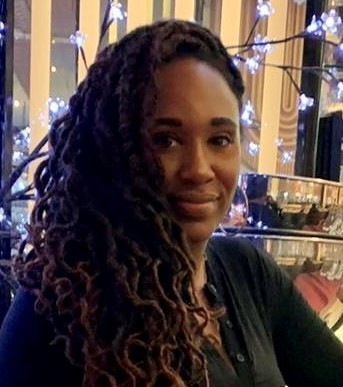 Hello, my name is Carlyn, I’m proud to lead the psychological therapy service in the West Yorkshire Staff Mental Health and Wellbeing Hub and I am delighted to have the opportunity to contribute this week’s leadership message for the Partnership.
Hello, my name is Carlyn, I’m proud to lead the psychological therapy service in the West Yorkshire Staff Mental Health and Wellbeing Hub and I am delighted to have the opportunity to contribute this week’s leadership message for the Partnership.
Having worked in local Improving Access to Psychological Therapy services (IAPT) previously (supporting adults with a range of mental health needs) , I have found a significant change going from public-facing work to a healthcare staff and volunteer focus. One thing is crystal clear - there is a reluctance for caregivers to receive care themselves and we must work to break down those barriers, providing more education on the array of options and specialist support available for everyone who works in health and care in West Yorkshire; including for those of different cultures, backgrounds, and beliefs. We continue to receive dozens of referrals each month and have a skilled team in place delivering a range of much-needed therapies to our people. We recognise that we can improve health outcomes by developing personalised approaches via the Hub and therapy service. Seeing health and wellbeing on a spectrum which is firmly rooted in relationships and contexts enables us to provide more joined up care.
Compassionate leadership is key to elevating all voices
This role has changed my approach to leadership. It’s been a huge learning curve to work with a smaller team of around 10, compared to a working team of 50 during my time at IAPT. Connecting on a different, deeper level within the team has shown the importance of compassionate leadership and my learning will hopefully inspire future leaders to raise their voices and lead the conversation. I believe that supporting leadership behaviours that are both brave and vulnerable, we can foster connection and understanding that results in equity and improved experiences for our people.
My leadership comes from a place of passion. Alongside my work with the Hub, I continue with the clinical work that I’ve loved for years. This clinical work helps me to be fully sighted on the issues that our workforce faces, and a full understanding and better insight across system. I am motivated by therapy work and the reward is the road to recovery for those we help and support.
I’m conscious of my role as a role model across the organisation. Being a black woman in a leadership role is something I’m incredibly proud of. I hope it can inspire others that anything can be possible, regardless of race and ethnicity.
I’m not one for slowing down and will always continue to look ahead. I, one day, hope to progress to consultant level, just so long as I can also continue the clinical work that I’ve always love. I would also continue to strive to address the gap in access to health services for deprived and marginalised communities.
Everyone is entitled to healthcare – and I will continue to advocate for all voices to be heard.
Thank you and have a good weekend,
Carlyn
Worried about your mental or emotional wellbeing?
If you are worried about your mental or emotional wellbeing, you can use the self-referral option into our psychological assessment and therapy service, specially set up to help you. The self-referral process asks you to complete a couple of questionnaires that might help you decide if such support would be useful for you at this time. If you choose to proceed, you can fill in a referral form that asks you to share a bit of information with us so that we can match your needs with a therapist that is best placed to help you.
Why working carers matter
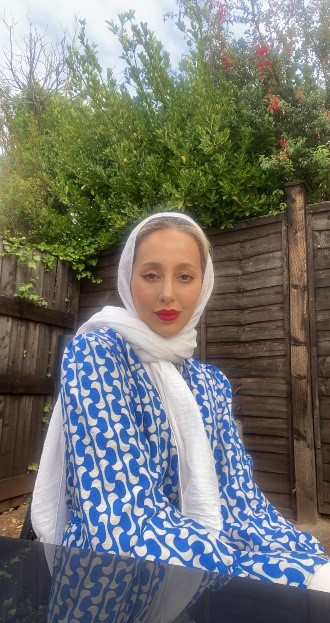 Hi, my name is Shaheen Kauser and I work in the long-term conditions and personalisation team as race equality project manager in the unpaid carers programme.
Hi, my name is Shaheen Kauser and I work in the long-term conditions and personalisation team as race equality project manager in the unpaid carers programme.
With Carers Rights Day on the 24 November, the time arrived to address the challenges unpaid carers have faced whilst working and providing care for a loved one. With the cost of living rising drastically this is impacting on many people and I am hearing many stories about how tough choices and rising prices are impacting people right to the brink of their capacity.
My core focus is to work in collaboration with our places across all sectors to increase identification of unpaid carers of our valued staff. Recognising the importance of supporting our staff as experts by experience. I am hopeful our partners in West Yorkshire are actively pursuing practical and meaningful tangible interventions by managers having conversations with their employees.
The working carer passport has been adopted by all our NHS and health care partners which is a fantastic way of recording staff who are caring and perhaps juggling their work responsibilities. We as a partnership are keen to embed the passport across all our NHS organisations.
I am currently piloting how we can successfully increase the recognition and support of our working carers at Calderdale Huddersfield Foundation Trust. I am pleased to say we have senior leadership buy in and support in order to make a lasting change to the wellbeing of our working carers with the vision of making this business as usual.
My message is: Are you someone who cares for a loved one who would not be able to cope without your support? You may be caring for someone a few hours a week or a number of hours per day. Have you spoken to your manager about your circumstances? Your manager will be able to support you and provide a safe space for you to discuss your caring arrangements and work. This is a statutory right you can make and many employers such as the West Yorkshire Health and Care Partnership have more generous support available.
Here is an outline of the support available for working carers.
- The Working Carers Passport- a live document and record of a conversation between an employee and their line manager to help employees balance work and unpaid care
- Support for line managers around The Working Carers Passport scheme, including recording on ESR
- ICB carers network, an employee-led staff network which provides peer support and contributes to key policies to foster an equal and positive workplace. Express interest and learn more
- Carers UK digital resource for both unpaid carers and line managers. You will need to register for a free account via the HR Team
- West Yorkshire Health and Care Partnership – Supporting working carers programme – my team - which aims to increase support and recognition for over 400,000 unpaid carers in the region
Line managers and for other employers outside of the partnership
It’s really important to be equipped with the relevant knowledge and training to support your workforce who are working carers. On our website you will find guidance to help you along the way.
This is the time to unite and make a real difference. Staff health and wellbeing is a priority for us all. Staff from all backgrounds including Black Asian and minority ethnic backgrounds face challenges around caring. Let’s seek to provide services and understanding of others faith and culture. We want to provide a sense of belonging for all our staff without fear of judgment. If you work in HR or in a position to support the uptake of working carer passport, please feel free to contact me: Shaheen.
Please enjoy the video below to support your understanding on working carers and the pressure they may be feeling internally. At least one in three of us will become an unpaid carer at some point in our lives, so it’s time to look after those who look after others.
Thank you for reading
Shaheen
What else has been happening this week?
Improving Population Health Programme Board
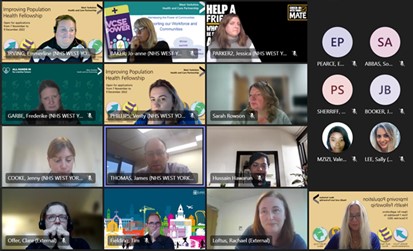 The Improving Population Health Programme Board, which met on Wednesday, 17 November, took a different format than usual. As the partnership refreshes its five-year strategy and as we grow and evolve in scope, it’s also timely to review and refresh the board.
The Improving Population Health Programme Board, which met on Wednesday, 17 November, took a different format than usual. As the partnership refreshes its five-year strategy and as we grow and evolve in scope, it’s also timely to review and refresh the board.
The board heard that across the partnership and beyond there is unanimous support for the work we do around the six programme areas: climate change; health and housing; health inequalities; prevention; suicide prevention; and the West Yorkshire Combined Authority.
Partnership working is key to the programme’s success. This includes setting up the Adversity, Trauma and Resilience Programme together with the West Yorkshire Violence Reduction Unit now incorporating over 300 members and pioneering projects to reduce serious violence. We’ve also set up the Health Inequalities Academy and Housing and Health Network and adapted a joint approach with the West Yorkshire Combined Authority on the determinants of health and impact on people. There’s also the Core20PLUS Connectors Programme and work with Places and campaigns to make suicide prevention and climate change everyone’s business. Going forward the board discussed making sure we continue to have the right ownership, influence and buy in across the system building on the huge amount of work that has already happened. Have a look at the annual report for more on some of those improving population health initiatives.
Following an overview of the population health journey so far and a look at our current priorities to support our population to thrive in healthy, equitable, safe and sustainable communities members split into workshops. The workshops provided the opportunity to look at and feedback on the role and function of the board, ways of working, priorities and how those fit with the priorities across the system.
Next steps are to reflect on that feedback and firm up proposals for refreshing the board to make the difference we know we are and can make. The next board meeting is planned for Thursday, 15 December 2022.
The Yorkshire and Humber Patient Safety Research Collaboration (YH-PSRC)
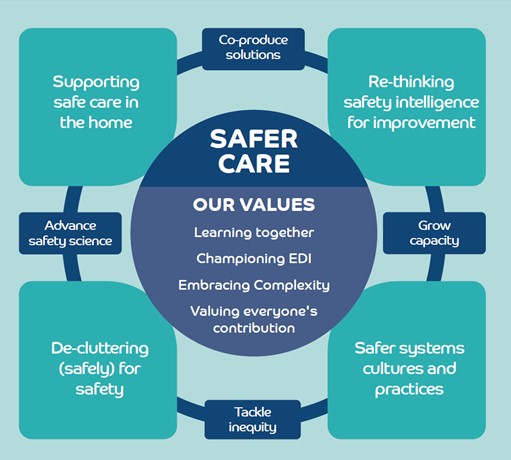 YH-PSRC will build on the success of our existing research centre. This is a collaboration between University of Leeds, one of the most research-intensive Universities in the country and Bradford Teaching Hospitals NHS Foundation Trust (BTHFT), a Trust in one of the most deprived areas of the country. Since being awarded the NIHR PSTRC funding in 2016, we have gone from strength to strength, become a leading national force in co-producing research that makes care safer. In doing this we have actively developed innovative and inclusive ways of involving patients, the public and local communities and healthcare staff in research.
YH-PSRC will build on the success of our existing research centre. This is a collaboration between University of Leeds, one of the most research-intensive Universities in the country and Bradford Teaching Hospitals NHS Foundation Trust (BTHFT), a Trust in one of the most deprived areas of the country. Since being awarded the NIHR PSTRC funding in 2016, we have gone from strength to strength, become a leading national force in co-producing research that makes care safer. In doing this we have actively developed innovative and inclusive ways of involving patients, the public and local communities and healthcare staff in research.
The solution-focused approach and collaborative research ethos has, in turn, attracted leaders in patient safety to join us in this new PSRC as theme leads and co-leads, members of our research team and our advisory board. The lay leader membership continues to grow as does the Safety In Numbers Group (SING), supporting us to deliver research that responds to patient experience and needs. Colleagues will now establish a programme of community research to understand and tackle safety inequity. As a group they will continue to learn from patient and family collaborators and develop skills in patient engagement within the research team. This learning will be shared with others.
The vision for the new NIHR YH-PSRC is to co-produce, implement and evaluate innovative solutions to make care safer for patients and their families. These will be grounded in an understanding of the realities of health and social care systems, particularly in this COVID-19 recovery period. We understand that healthcare is delivered and experienced by patients across a complex health and social care system. Acknowledging and embracing this complexity is essential if we are to deliver effective solutions to patient safety problems.
Leeds Digital Strategy
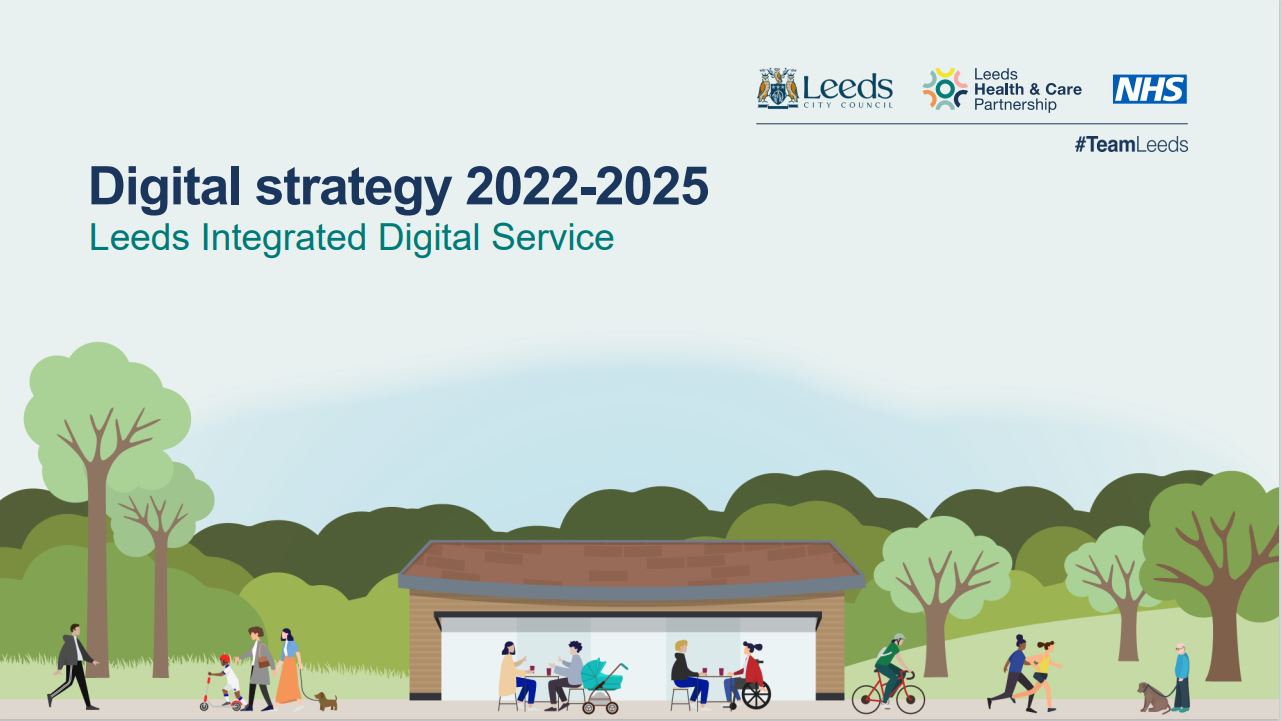 Leeds is working together to ensure that the opportunities arising from the advancements in digital technology are inclusive and accessible to all. To help encapsulate its work the city has collaborated on a Leeds Digital Strategy which is available here - Digital Strategy 2022-2025 | Inclusive Growth Leeds.
Leeds is working together to ensure that the opportunities arising from the advancements in digital technology are inclusive and accessible to all. To help encapsulate its work the city has collaborated on a Leeds Digital Strategy which is available here - Digital Strategy 2022-2025 | Inclusive Growth Leeds.
The Leeds Digital Strategy involved extensive engagement as part of its development and has been written from a ‘whole city and person’ perspective, encouraging organisations and individuals across the city to adopt it and participate in delivering it.
The strategy takes a ‘life course’ approach, outlining how digital can support people through each stage of their life: Starting Well, Working Well, Living Well and Ageing Well, which is aligned with Leeds City Council’s Best City Ambition. It is intended to be a 'live' document that will be updated as progress is made and priorities change. To find out more or how to get involved please get in contact with the team at hello
Yorkshire Health and Care Record (YHCR) update for Leeds
Colleagues at Leeds Teaching Hospitals NHS Trust can now view regional data from the Yorkshire Health and Care Record (YHCR) in PPM+ (the Trust’s Electronic Health Record system) and the Leeds Care Record. This will enable Leeds clinicians to view any data available through the YHCR without needing to use a separate system. YHCR is a secure computer system that brings together important information about patients who have used services provided by their GP, at a local hospital, community healthcare, social services, or mental health teams.
Refreshing our five-year strategy
The Health and Care Act 2022 introduced new legislative measures that aim to make it easier for health and care organisations to deliver joined-up care for people. As part of the new statutory arrangements, the Act describes how ‘Integrated Care Partnerships’ (ICPs, for West Yorkshire this is our Partnership Board) will bring together a wider range of partners, not just the NHS, to develop a strategy to address the broader health, public health, and social care needs of people and communities.
The West Yorkshire Health and Care Partnership (our Integrated Care System), published ‘Better Health and Care for Everyone: Our Five Year Plan’ in March 2020, setting out how we work together to give everyone in West Yorkshire the very best start and every chance to live a long and healthy life.
Since its publication, the context and focus for our work has changed significantly. Whilst we have made good progress across a range of areas in our strategy, the COVID-19 pandemic and cost of living crisis has meant that our Partnership has needed to shift its focus away from our priorities to more immediate operational pressures. The scale of challenge has also increased in several areas, most notably the widening of health inequalities.
The refresh of our five-year strategy will be discussed at our Partnership Board on Tuesday 6 December. This will include sharing a draft with all Board members for their comments. The work has been developed by over 100 colleagues from across our local places (Bradford District and Craven, Calderdale, Kirklees, Leeds and Wakefield District) and West Yorkshire Programmes, as well as wider partners.
Over the coming weeks we will be refining the strategy ready for it to be published in the Spring. The delivery of how we will deliver our five-year strategy will be set out in our new Joint Forward Plan, publication expected April 2023.
We will continue to ask people for their views on the strategy and the plan over the coming months, alongside keeping people and communities updated on the work as it progresses. You can read more about the work which is available in alternative formats on our website.
West Yorkshire People Panel project group
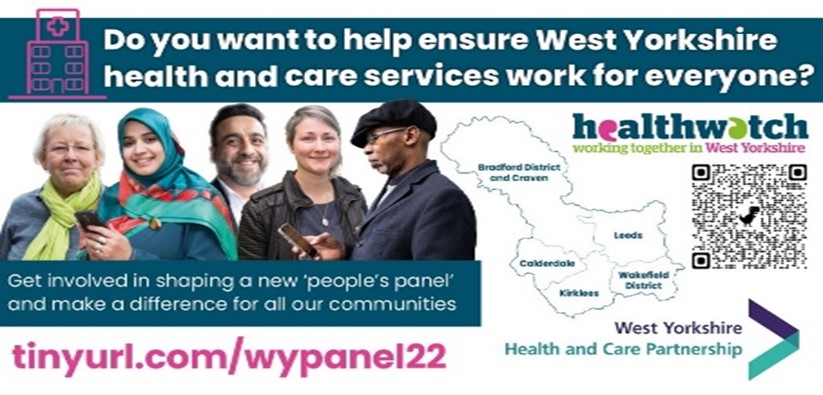 Over 300 people have expressed an interest in getting involved in the development of our new West Yorkshire People Panel (working title). This will build on local networks and link into the work and decisions made at West Yorkshire Partnership Board and the NHS West Yorkshire Integrated Care Board.
Over 300 people have expressed an interest in getting involved in the development of our new West Yorkshire People Panel (working title). This will build on local networks and link into the work and decisions made at West Yorkshire Partnership Board and the NHS West Yorkshire Integrated Care Board.
To help take forward this work a small project group, made up of Healthwatch colleagues and local people met on Tuesday for the first time. There was a conversation on people’s early thoughts around the name of the panel, how they can influence the work and incentives to get involved alongside reimbursement for time. The survey closes today on Friday.
A report will be shared with early findings ahead of people coming together to discuss the next steps. The work will be supported by a Healthwatch people panel coordinator.
Children, young people and families
We are delighted with the news that the West Yorkshire Children and Young Peoples ‘Complications from Excess Weight’ (CEW) service has been recognised by the European Association for Study of Obesity as a ‘Collaborating Centre for Obesity Management’. This status recognises West Yorkshire’s service as only one of 11 across Europe and only one of two across the UK.
Maternity support worker celebration day, 24 November
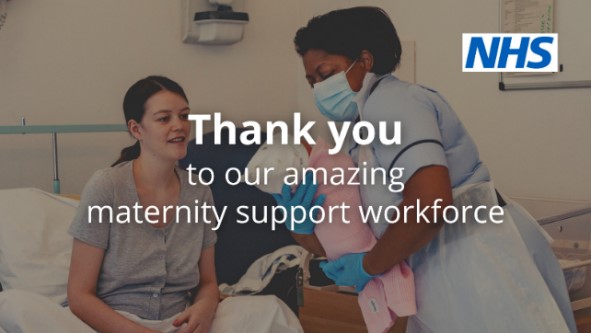 Thursday 24 November was maternity support worker (MSW) celebration day. In support of this occasion the West Yorkshire and Harrogate Local Maternity and Neonatal System (WY&H LMNS) sent a special bulletin to all the MSWs across West Yorkshire along with a card of appreciation. Beverley Geary Director of Nursing-Designate, West Yorkshire Integrated Care Board, shared a special message of thanks.
Thursday 24 November was maternity support worker (MSW) celebration day. In support of this occasion the West Yorkshire and Harrogate Local Maternity and Neonatal System (WY&H LMNS) sent a special bulletin to all the MSWs across West Yorkshire along with a card of appreciation. Beverley Geary Director of Nursing-Designate, West Yorkshire Integrated Care Board, shared a special message of thanks.
“To all our maternity support workers (MSWs) across the WY&H LMNS on maternity support worker celebration day we’d like to take this opportunity to recognise all of you and the work you do. Your hard work and dedication makes a huge difference to your colleagues, women and their families across West Yorkshire. MSWs are an integral part of the maternity workforce and play a very important role in maternity care and supporting midwives. Your commitment and hard work is very much appreciated especially during these ongoing challenging times for maternity and neonatal services. Thank you all and best wishes on this day of celebration.”
Beverley Geary Director of Nursing-Designate, West Yorkshire Integrated Care Board

